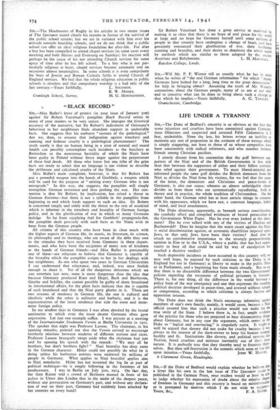BLACK RECORD "
many of your readers to be very unjust. She impugns the historical accuracy of the narrative, but Sir Robert's indictment of Germany's behaviour to her neighbours finds abundant support in undeniable facts. She suggests that his outburst " savours of the pathological."
Are we, then, to assume that indignation against treachery and cunning and hideous cruelty is a pathological phenomenon? The truth surely is that no human being in a state of mental and moral health can possibly contemplate such incidents as the butchery at Rotterdam or the monstrous bestiality of which the Nazis have been guilty in Poland without fierce anger against the perpetrators of these foul deeds. All those who know but one tithe of the grim facts are ready to admit that no language is too violent to describe the deliberate and calculated cruelty of the Nazis.
Miss Buller's main complaint, however, is that Sir Robert has put a powerful weapon into the hands of Goebbels, a weapon which will be used for the purpose of " uniting every German who is not retrograde." In this way, she suggests, the' pamphlet will simply strengthen German resistance and thus prolong the war. Her con- tention is that Sir Robert, by implication, has raised a threat to German Existenz—but there is not a syllable in the pamphlet from beginning to end which lends support to such an idea. Sir Robert is concerned simply and solely with the threat to the rest of mankind which is inherent in the treachery and brutality of German foreign policy, and in the glorification of war in which so many Germans indulge. So far from supplying fuel for Goebbels' propaganda-fire, the pamphlet deals precisely with such facts as the Nazis wish to keep from the German people.
All citizens of this country who have been in close touch with the higher aspects of German life, its music, its literature, its science, its philosophy and its theology, who are aware of the debt they owe to the stimulus they have received from Germany in these depart- ments, and who have been the recipients of many acts of kindness at the hands of German friends—and Miss Buller is presumably one of these—are reluctant to believe that Germany is capable of the brutality which the pamphlet assigns to her in her dealings with her neighbours. As one who spent two years in German Universities I can understand that reluctance, and, indeed, was once foolish enough to share it. Yet of all the dangerous delusions which we
can entertain just now, none is more dangerous than the idea that
because Germany produced Kant and Hegel, Bach and Beethoven, Goethe and Schiller, she cannot possibly be guilty of sheer brutehood
in international affairs, for the plain facts indicate that she is capable
of such brutehood and that the Nazi party glories in it. There are two streams of tendency in German life, the one is cultural and idealistic while the other is militarist and barbaric, and it is the representatives of the latter tendency that rule the roost and deter- mine foreign policy.
In my student days in Germany I was often shocked by the brutal sentiments to which even the more decent Germans often gave expression. Let just one example suffice. I was present at a meeting
of the Internationaler Studenten Verein at Berlin University in 1911. The speaker that night was Professor Lasson. The chairman, in his opening remarks, pointed out that the Verein existed to encourage
brotherly relations between students of different nations and races. Professor Lasson brusquely swept aside what the chairman had just said by opening his speech with the remark : " We may all be brothers, but don't brothers fight? " Nazi brutality has deep roots in the German character. Hitler could not possibly do what he is doing unless his barbarous notions were endorsed by millions of people in Germany. What applies to Nazi brutality applies also to Nazi mendacity. Hitler has not invented the big lie as part of political technique—he is simply following in the footsteps of his predecessors. I was in Berlin on July 31st, 1914. On that day, the then Kaiser told a crowd of Berliners massed in front of his palace in Unter den Linden that in the midst of the deepest peace, without any provocation on Germany's part, and without any declara- tion of war on their part, Germany had suddenly been attacked by her enemies on every hand I
Sir Robert Vansittart has done a great service to mankind by making it so clear that there is no hope of real peace for the world at large and no hope for Germany herself until some millions of people in that country have undergone a change of heart, and have genuinely renounced their glorification of war, their loathsome cunning and brutality, and their desire to dominate the whole world by methods which are similar to those adopted by the ancient






























 Previous page
Previous page